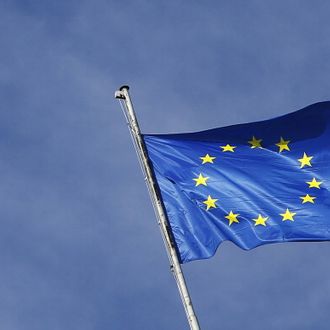
A report from German magazine Der Spiegel says the NSA bugged the offices and computer networks of European Union representatives in Washington. This information came via a “top secret” 2010 document provided by Edward Snowden, who is maybe tired of talking to The Guardian people all the time (though one of the bylines on the Spiegel story, that of documentary filmmaker Laura Poitras, is one dedicated Snowden watchers will remember from The Guardian’s piece introducing the NSA leaker to the world earlier this month). The magazine also reports that the NSA similarly targeted EU diplomats to the United Nations.
Another document — this one apparently from an unnamed source — also indicates that the US intelligence carried out an electronic eavesdropping operation in Belgium about five years ago, when EU security offices noticed that some telephone calls were “targeting the remote maintenance system” of the EU Brussels headquarters. “The calls were made to numbers that were very similar to the one used for the remote administration of the building’s telephone system,” reports Der Spiegel. “Security officials managed to track the calls to NATO headquarters in the Brussels suburb of Evere. A precise analysis showed that the attacks on the telecommunications system had originated from a building complex separated from the rest of the NATO headquarters that is used by NSA experts.”
According to Der Spiegel, the NSA also monitors half a billion phone calls, e-mails, and text messages in Germany per month. While Snowden had previously disclosed that the NSA collected German data, the scale of it was not known. Though Germany is considered one of the United States’ main allies, NSA documents show that the country was categorized as a “third-class partner,” to be monitored at levels similar to China, Iraq, and Saudi Arabia. (To put it in perspective: The NSA watches 20 million German phone connections and 10 million internet data sets on an average day, while only tapping 2 million connections in France during similar periods.)
Der Spiegel’s report prompted a lot of public outrage from officials in Europe. Martin Schulz, the president of the European Parliament, said he was “deeply worried and shocked about the allegations of U.S. authorities spying on EU offices.” He also warned that the information could have “a severe impact on EU-US relations.” Germany’s Justice Minister, Sabine Leutheusser-Schnarrenberger, called the contents of the report “reminiscent of the actions of enemies during the Cold War,” adding, “It is beyond imagination that our friends in the US view Europeans as the enemy.” Meanwhile, France’s Minister of Foreign Affairs, Laurent Fabius, told Le Monde, “These facts , if confirmed, would be totally unacceptable. We expect the U.S. authorities to stand up as soon as possible the legitimate concerns raised by the revelations of the press.” And Belgium’s former prime minister, Guy Verhofstadt, who now leads the European Parliament liberals, called the situation “absolutely unacceptable” and one that “must be stopped immediately.”
However, as with The Guardian’s revelations two weeks ago about American and British spying at the G20 summit, Der Spiegel’s information does not actually seem to be major news to the story’s main subjects. Robert Madelin, a senior British official in the European commission, tweeted, “EU trade negotiators have always assumed someone listened.” And one Brussels official told The Guardian, “There’s a certain schadenfreude here that we’re important enough to be spied on. This was bound to come out one day. And I wouldn’t be surprised if some of our member states were not doing the same to the Americans.” Mostly, Belgian officials seem to be worried about how the story might impact — or, more likely, overshadow — the free trade talks between Brussels and Washington scheduled for next week. If everyone’s as aware of one another’s spying as they appear to be, then we’re sure it won’t be too awkward.
This post has been updated throughout.





























